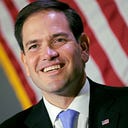The Moon Landing Was America’s Defining Moment
By Marco Rubio | Orlando Sentinel
“For thousands of years now, it’s been man’s dream to walk on the moon,” said legendary CBS anchor Walter Cronkite as he watched Apollo 11 touch down on the lunar surface. Teary-eyed and awestruck, Cronkite marveled that “Now, a 38-year-old American, standing on the surface of the moon.”
That moment, 50 years ago today, was a testament to American innovation, domestic industry, and a national desire to win the future. It was America at her best — and it didn’t happen by chance. Eight years earlier, President John F. Kennedy challenged Congress and the nation “to take a clearly leading role in space achievement, which in many ways may hold the key to our future on earth.”
Kennedy added, “This very risk enhances our stature when we are successful.” And it did, as 650 million people across the world watched the events unfold in real time. It left the undeniable impression that America was the place to be, and would win “the battle … between freedom and tyranny.”
My grandfather, who was born in 1899 in rural Cuba at a time when airplanes didn’t even fly, recalled it being the moment that he knew anything was possible in America. As he sat in his living room that evening, he watched a human being walk on the moon. For him, it reaffirmed that he lived in the greatest country in the world surrounded by the greatest people.
Indeed, it was a moment that brought people together, inspired future generations, and gave rise to the technologies that dominate our lives today. It was only through what Kennedy described as a “great new American enterprise” that such things were possible.
“We possess all the resources and talents necessary,” argued Kennedy. But “we have never made the national decisions or marshaled the national resources required for such leadership.”
It was a triumph of America, but with politics invading every corner of today’s life, it is easy to lose sight of what we as Americans can accomplish when we are united and focused on a national objective.
For many Americans, the entire concept is foreign. More than two-thirds of Americans were born after Apollo 11 or were too young to remember the moon landing.
Nonetheless, it remains possible for us to channel our national energy into something more meaningful than daily outrages and grievances. And we must, because 50 years after the United States put a man on the moon, China landed a probe on the dark side of the moon. If we lay down the mantle of international leadership, someone elsewhere will take it up.
NASA has lofty goals, but they are achievable ones if we unite to establish a consensus agenda and a constancy of purpose. Fortunately, America is more than capable of rising to the challenge. Our commercial space industry is thriving, and its unique partnership with NASA is producing innovation and technological advances once unthinkable. Deep space exploration is on the horizon, and it too could hold the key to our future.
Armstrong’s iconic words — “That’s one small step for man; one giant leap for mankind” — remind us all that we can be part of something much larger than ourselves. Kennedy’s appeal to American exceptionalism resonated because Americans are the children of pilgrims, immigrants, and slaves. Whether our challenges are terrestrial or among the stars, it is our uniquely American nature to confront them head-on and strive for greatness.
America has always been a nation of exploration. As we face new challenges in the 21st century, it is critical to remember what we, as Americans, can accomplish when our nation is united in a common goal.
Originally published at www.orlandosentinel.com on July 20, 2019.
